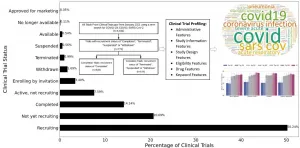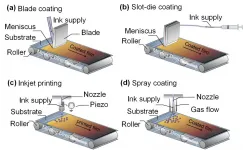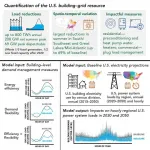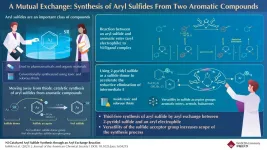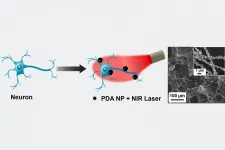(Press-News.org) In order to win the battle against COVID-19, studies to develop vaccines, drugs, devices and re-purposed drugs are urgently needed. Randomized clinical trials are used to provide evidence of safety and efficacy as well as to better understand this novel and evolving virus. As of July 15, more than 6,180 COVID-19 clinical trials have been registered through ClinicalTrials.gov, the national registry and database for privately and publicly funded clinical studies conducted around the world. Knowing which ones are likely to succeed is imperative.
Researchers from Florida Atlantic University's College of Engineering and Computer Science are the first to model COVID-19 completion versus cessation in clinical trials using machine learning algorithms and ensemble learning. The study, published in PLOS ONE, provides the most extensive set of features for clinical trial reports, including features to model trial administration, study information and design, eligibility, keywords, drugs and other features.
This research shows that computational methods can deliver effective models to understand the difference between completed vs. ceased COVID-19 trials. In addition, these models also can predict COVID-19 trial status with satisfactory accuracy.
Because COVID-19 is a relatively novel disease, very few trials have been formally terminated. Therefore, for the study, researchers considered three types of trials as cessation trials: terminated, withdrawn, and suspended. These trials represent research efforts that have been stopped/halted for particular reasons and represent research efforts and resources that were not successful.
"The main purpose of our research was to predict whether a COVID-19 clinical trial will be completed or terminated, withdrawn or suspended. Clinical trials involve a great deal of resources and time including planning and recruiting human subjects," said Xingquan "Hill" Zhu, Ph.D., senior author and a professor in the Department of Computer and Electrical Engineering and Computer Science, who conducted the research with first author Magdalyn "Maggie" Elkin, a second-year Ph.D. student in computer science who also works full-time. "If we can predict the likelihood of whether a trial might be terminated or not down the road, it will help stakeholders better plan their resources and procedures. Eventually, such computational approaches may help our society save time and sources to combat the global COVID-19 pandemic."
For the study, Zhu and Elkin collected 4,441 COVID-19 trials from ClinicalTrials.gov to build a testbed. They designed four types of features (statistics features, keyword features, drug features and embedding features) to characterize clinical trial administration, eligibility, study information, criteria, drug types, study keywords, as well as embedding features commonly used in state-of-the-art machine learning. In total, 693 dimensional features were created to represent each clinical trial. For comparison purposes, researchers used four models: Neural Network; Random Forest; XGBoost; and Logistic Regression.
Feature selection and ranking showed that keyword features derived from the MeSH (medical subject headings) terms of the clinical trial reports, were the most informative for COVID-19 trial prediction, followed by drug features, statistics features and embedding features. Although drug features and study keywords were the most informative features, all four types of features are essential for accurate trial prediction.
By using ensemble learning and sampling, the model used in this study achieved more than 0.87 areas under the curve (AUC) scores and more than 0.81 balanced accuracy for prediction, indicating high efficacy of using computational methods for COVID-19 clinical trial prediction. Results also showed single models with balanced accuracy as high as 70 percent and an F1-score of 50.49 percent, suggesting that modeling clinical trials is best when segregating research areas or diseases.
"Clinical trials that have stopped for various reasons are costly and often represent a tremendous loss of resources. As future outbreaks of COVID-19 are likely even after the current pandemic has declined, it is critical to optimize efficient research efforts," said Stella Batalama, Ph.D., dean, College of Engineering and Computer Science. "Machine learning and AI driven computational approaches have been developed for COVID-19 health care applications, and deep learning techniques have been applied to medical imaging processing in order to predict outbreak, track virus spread and for COVID-19 diagnosis and treatment. The new approach developed by professor Zhu and Maggie will be helpful to design computational approaches to predict whether or not a COVID-19 clinical trial will be completed so that stakeholders can leverage the predictions to plan resources, reduce costs, and minimize the time of the clinical study."
INFORMATION:
The study was funded by the National Science Foundation awarded to Zhu.
About FAU's College of Engineering and Computer Science:
The FAU College of Engineering and Computer Science is internationally recognized for cutting edge research and education in the areas of computer science and artificial intelligence (AI), computer engineering, electrical engineering, bioengineering, civil, environmental and geomatics engineering, mechanical engineering, and ocean engineering. Research conducted by the faculty and their teams expose students to technology innovations that push the current state-of-the art of the disciplines. The College research efforts are supported by the National Science Foundation (NSF), the National Institutes of Health (NIH), the Department of Defense (DOD), the Department of Transportation (DOT), the Department of Education (DOEd), the State of Florida, and industry. The FAU College of Engineering and Computer Science offers degrees with a modern twist that bear specializations in areas of national priority such as AI, cybersecurity, internet-of-things, transportation and supply chain management, and data science. New degree programs include Masters of Science in AI (first in Florida), Masters of Science in Data Science and Analytics, and the new Professional Masters of Science degree in computer science for working professionals. For more information about the College, please visit eng.fau.edu.
About Florida Atlantic University:
Florida Atlantic University, established in 1961, officially opened its doors in 1964 as the fifth public university in Florida. Today, the University serves more than 30,000 undergraduate and graduate students across six campuses located along the southeast Florida coast. In recent years, the University has doubled its research expenditures and outpaced its peers in student achievement rates. Through the coexistence of access and excellence, FAU embodies an innovative model where traditional achievement gaps vanish. FAU is designated a Hispanic-serving institution, ranked as a top public university by U.S. News & World Report and a High Research Activity institution by the Carnegie Foundation for the Advancement of Teaching. For more information, visit http://www.fau.edu.
Scientists at St. Jude Children's Research Hospital have found a link between post-cancer treatment frailty and neurocognitive decline in young adult childhood cancer survivors. A paper on this work was published today in the Journal of Clinical Oncology.
Though frailty is often associated with the elderly, 8% of young adult childhood cancer survivors meet the criteria for frailty. This study confirms that those who undergo childhood cancer treatment can experience frailty, which can create an early onset of neurocognitive decline in young adults. This study will help with further research to prevent such neurocognitive decline.
"We ...
To reach the target of carbon neutral, a transition from fossil energy to renewable energy generation is indispensable. Photovoltaic technology is considered as one of the most prominent sources of renewable energy. For decades, about 90% of global solar cell market has been dominated by silicon solar cells. Although the price of silicon solar panels decreases year by year, it is a big challenge to significantly reduce its manufacturing cost further. Hence, next-generation photovoltaic technologies are in urgent need of new materials and novel techniques. Recently, metal halide perovskite solar cells (PSCs) have attracted extensive attention from both academia and industry, due to their excellent photoelectric conversion efficiency and great commercial potential.
Metal halide perovskite ...
One of the major challenges in modern cancer therapy is the adaptive response of cancer cells to targeted therapies: initially, these therapies are very often effective, then adaptive resistance occurs, allowing the tumor cells to proliferate again. Although this adaptive response is theoretically reversible, such a reversal is hampered by numerous molecular mechanisms that allow the cancer cells to adapt to the treatment. The analysis of these mechanisms is limited by the complexity of cause and effect relationships that are extremely difficult to observe in vivo in tumor samples. In order to overcome this challenge, a team from the University of Geneva (UNIGE) ...
In the United States, climate change is controversial, which makes communicating about the subject a tricky proposition.
A recent study by Portland State researchers Brianne Suldovsky, assistant professor of communication, and Daniel Taylor-Rodriguez, assistant professor of statistics, explored how liberals and conservatives in Oregon think about climate science to get a better sense for what communication strategies might be most effective at reaching people with different political ideologies. The study was published in Climatic Change in June.
Prior studies have shown that exposing climate change skeptics, ...
Over the past six months, the World Health Organization has categorized four SARS-CoV-2 variants as being "of concern" because they are more transmissible or may escape the immune response. They have been termed the Alpha, Beta, Gamma and Delta variants. Scientists from the Institut Pasteur, in collaboration with the French National Health Insurance Fund (CNAM), Ipsos and Santé publique France, conducted a nationwide case-control study to evaluate the effectiveness of mRNA vaccines against symptomatic forms of SARS-CoV-2 infection, be that non-variant virus or the Alpha and Beta variants. The results show that the two-dose vaccination regimen of mRNA vaccines provides 88% protection against non-variant virus, 86% against the Alpha variant and 77% against the Beta ...
Tsukuba, Japan - Rice is the world's most commonly grown and consumed crop. It also supports lives and livelihoods, especially in low- and middle-income regions. As such, methods for securing abundant and profitable rice harvests are key in global food security.
The System of Rice Intensification (SRI) offers a repeatable, sustainable system for increasing rice yields. It brings together fundamental planting and harvesting techniques such as strategically spacing plants, minimizing water, and transplanting seedlings. These practices can be repeated in varying conditions. While SRI has been around since ...
Since buildings consume 75% of electricity in the U.S., they offer great potential for saving energy and reducing the demands on our rapidly changing electric grid. But how much, where, and through which strategies could better management of building energy use actually impact the electricity system?
A comprehensive new study led by researchers from the Department of Energy's Lawrence Berkeley National Laboratory (Berkeley Lab) answers these questions, quantifying what can be done to make buildings more energy efficient and flexible in granular detail by both time (including time of day and year) and space (looking at regions across the U.S.). The research team, which also included scientists from the National Renewable Energy Laboratory (NREL), found that ...
Aryl sulfide, an aromatic compound in which sulfur is attached to an aryl (a functional group derived from an aromatic ring), is found in biologically active materials effective against asthma, Alzheimer's disease, and cancer. As a result, chemists have shown a lot of interest in synthesizing aryl sulfides. Traditionally, carbon-sulfur (C-S) bond formation reactions between thiols and aryl electrophiles catalyzed by transition metals have been employed for aryl sulfide synthesis because of their high reliability. However, thiols have an unpleasant smell and are toxic. Could there be a way to synthesize aryl sulfides that avoids the ...
A new study of almost 12,000 Australians has found one-third of the adult population has experienced pure cybercrime during their lifetime, with 14% reporting this disruption to network systems in the past 12 months.
With all forms of cybercrime already costing trillions every year globally, experts from the Australian Institute of Criminology (AIC) and Flinders University say the crimes involved substantial levels of personal victimisation including direct losses as well as the high cost of preventing future attacks.
A pre-COVID-19 snapshot of the cost of 'pure cybercrime' in 2019 has found an approximate ...
Nanomaterials have been used in a variety of emerging applications, such as in targeted pharmaceuticals or to bolster other materials and products such as sensors and energy harvesting and storage devices. A team in the McKelvey School of Engineering at Washington University in St. Louis is using nanoparticles as heaters to manipulate the electrical activity of neurons in the brain and of cardiomyocytes in the heart.
The findings, published July 3, 2021, in Advanced Materials, have the potential to be translated to other types of excitable cells and serve as a valuable tool in nano-neuroengineering.
Srikanth Singamaneni, a materials scientist, and Barani Raman, a biomedical engineer, and their teams collaborated to develop a noninvasive technology that inhibits the electrical ...
